Heading out the door? Read this article on the new Outside+ app available now on iOS devices for members! Download the app.
This past weekend’s Boulder and Speed World Cup in Salt Lake City kicked off just five days after the conclusion of the previous World Cup in Salt Lake City. Yet, it was evident from the get-go that the second of the back-to-back weekend events in Utah would not be an exact replica of its predecessor.
For starters, hours before showtime, Japan’s Tomoa Narasaki—one of the favorites to win the men’s Boulder discipline—announced on Instagram that he had tested positive for COVID and would thus be absent for the entirety of the competition. Additionally, several countries shifted their rosters compared to the previous weekend. Other countries that had been absent from the season’s first Salt Lake City World Cup, such as Mauritius and South Korea, fielded teams. The weather was wholly different as well, with the previous weekend’s mountain chill giving way to blazing heat and periodic showers.
Yet, in the end, despite some new names creating some memorable moments, the second pit stop in Salt Lake City offered a continuation of Team USA’s history-making Boulder season and even more soon-to-be-legendary runs in the Speed discipline. Here’s how it all played out.
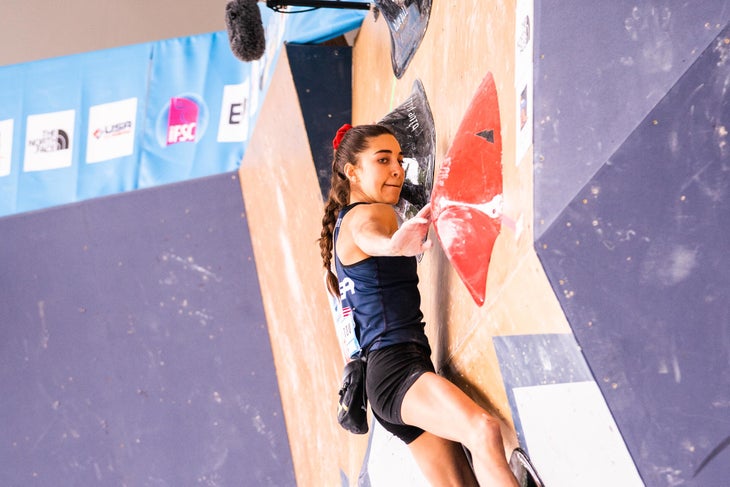
More Speed records smashed
An epic tone was set early in the Speed, as a number of records were broken during the qualification round on Friday afternoon. First, Indonesia’s Kiromal Katibin set a new men’s world record of 5.105 seconds (beating his own world record, set earlier this season in Seoul). Moments later, in the women’s heats, Emma Hunt clocked a time of 7.174 seconds to set a new American record. She promptly followed this up in her next race by chipping away at her own national record even more—finally setting a time of 7.053 seconds to lock in the new-new American record. To top it all off, Poland’s Aleksandra Miroslaw soon set a new women’s world record of 6.534 seconds.
The plethora of records was undoubtedly the big story of the afternoon, but buried beneath all the glitz and celebration was the fact that a number of other American competitors had stellar qualification runs as well. These included John Brosler and Samuel Watson in the men’s division. Watson, for instance, made waves for setting a personal best in-competition time of 5.73 seconds, while Brosler clocked a clutch time of 5.572 seconds late in the men’s qualification round. In the women’s division, Piper Kelly and Callie Close notched fast times (8.41 seconds for Kelly; 8.44 for Close) to join the round’s figurative highlight reel alongside Hunt.
The Speed finals kicked off with a string of close races in the men’s division that kept fans in attendance on the edge of their seats. Austria’s Tobias Plangger edged out South Korea’s Euncheol Shin, and Indonesia’s Veddriq Leonardo beat Canada’s Ethan Pitcher to enliven the crowd. Yet, a massive upset occurred when Indonesia’s Katibin—the runaway favorite—slipped and did not finish a race against Poland’s Marcin Dzienski. The crowd in Salt Lake City stood in a hushed silence for a moment, until Katibin’s Indonesian compatriot, Leonardo, and Team USA’s Watson engaged in one of the most thrilling races of the evening. Leonardo ultimately clenched the win by 0.6 seconds, and soon found himself in the Big Final—where he promptly earned gold by beating Austria’s Plangger (after Plangger slipped and did not finish). A Small Final was contested for the bronze, in which Italy’s Ludovico Fossali narrowly beat Dzienski while also setting a personal best time of 5.490 seconds.
The women’s Speed final was marked by consistently fast races from Poland’s Speed stalwart Aleksandra Miroslaw, including victorious races against Ukraine’s Tetiana Kolkotin, France’s Capucine Viglione, and Polish compatriot Natalia Kalucka. But Team USA’s Emma Hunt rocketed to victory in a number of heats as well, including a crowd-favorite race against American teammate Callie Close, and subsequent races against Italy’s Beatrice Colli and Poland Aleksandra Kalucka.
This all funneled into an epic Big Final showdown between Miroslaw and Hunt for the gold medal. Hunt slipped and did not finish the race, but still managed to come away from the event with a silver medal—and that new American record. In earning the victory, Miroslaw notched her third gold medal in a row for the season. The bronze went to Aleksandra Kalucka, who beat sister-and-compatriot Natalia Kalucka in a Small Final.
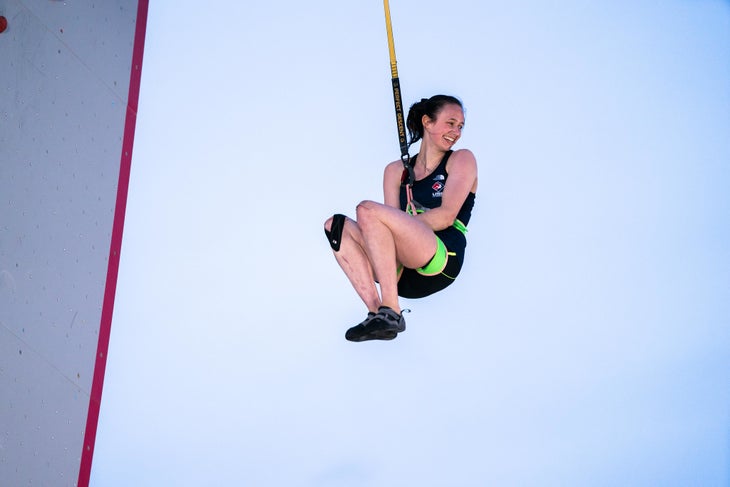
Grossman continues to be unstoppable
One of the biggest questions heading into the Boulder discipline was whether Natalia Grossman, now unequivocally American climbing royalty based on her medal count, could duplicate the success she had had the previous weekend in Salt Lake City. From the get-go, the answer seemed to be an emphatic “Yes!”
Grossman surged through the women’s qualification round, making quick work of the initial two slab boulders and appearing unfazed by the increasing steepness of the rest of the round’s blocs. She concluded the round with five tops, but many other competitors also topped everything in the round—including Grossman’s compatriot and friend Brooke Raboutou, Team Japan’s Futaba Ito and Miho Nonaka, Austria’s Jessica Pilz and Franziska Sterrer, France’s Oriane Bertone, Israel’s Ayala Kerem, and Germany’s Afra Honig.
Such a large grouping of early standouts began to separate in the women’s semi-finals, where Kerem, Raboutou, and Nonaka set the highest benchmarks of the round with four tops apiece. At one point, Grossman found herself stymied by a puzzle of black volumes on a steeply overhung third boulder; she wasn’t able to top it, but saved her round by earning a crucial top on the slabby fourth boulder. South Korea’s Chaehyun Seo, a mainstay on Lead podiums, was also able to secure several key tops, which vaulted her into a Boulder World Cup for the first time in her career.
In the finals, Seo continued to look stellar and flashed the first two boulders. Many other competitors—including Grossman, Raboutou, and Nonaka—topped the initial boulders as well. In fact, the women’s field did not significantly separate until the third boulder, a long slab traverse that entailed a controlled trot across a pair of pink slopers. Seo and Kerem couldn’t dial in the tricky sequence in time, which allowed the other competitors to pull ahead in the scores.
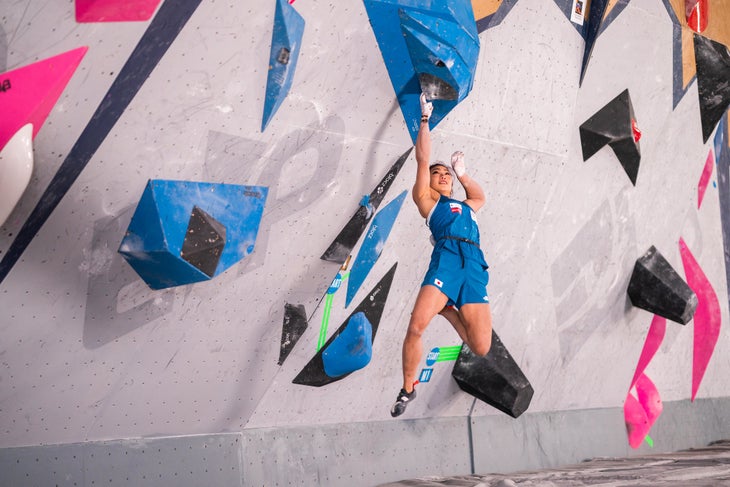
The separation in the field was even more drastic on the climactic fourth boulder, a steep overhang that snaked around an arete. Backdropped by roaring cheers from the crowd, Grossman cruised up the boulder’s steep angle, perfectly executed a swinging reach to the zone hold, and coasted to the top. In being the only competitor to top all four finals boulders, Grossman locked in the gold medal. Three tops apiece for Nonaka and Raboutou in the round resulted in silver and bronze medals, respectively.
Ogata brings it down to the wire
A clanging of cowbells and some blasting of airhorns from the enthusiastic crowd heralded the arrival of Team USA’s Sean Bailey and Colin Duffy early in the men’s Boulder qualification round. The two did not disappoint the raucous fans, and each blitzed through the first few boulders. Interestingly, judges ordered Bailey to climb the second boulder—a dihedral slab—twice, after his initial top of the boulder was deemed uncontrolled. But he made quick work of it on the requisite repeat ascent, and eventually finished the round with five tops. Duffy was close behind in the qualification scores with four tops. American compatriots Ross Fulkerson and Zach Galla also finished high on the scorecards (with four tops, and three tops, respectively).
Yet, the standout squad of the men’s qualification round was Team Japan. Keita Dohi led the group with five tops, but near him in the scorecards were other well-known names such as Tomoaki Takata, Kokoro Fujii, and Yoshiyuki Ogata, all finishing in the Top 20.
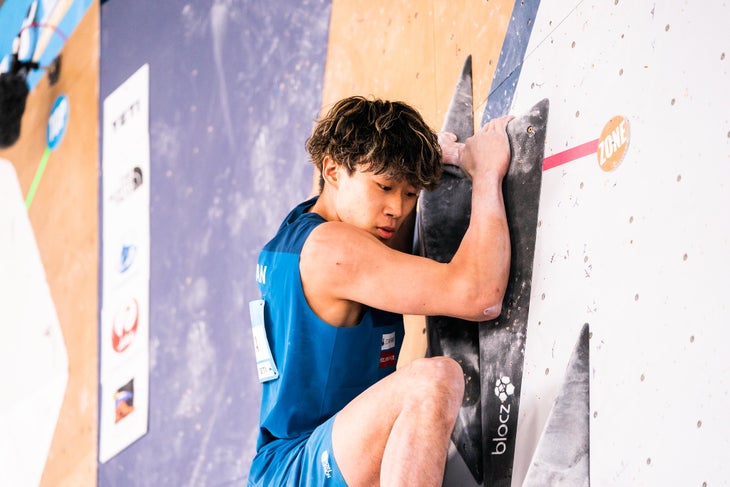
Japan’s depth was lessened by a difficult semi-final round, as was Team USA’s. For example, Bailey and Duffy fought valiantly through all the boulders, but did not clench enough tops to stay safe in the scores. Yet, one of the biggest standouts was their American compatriot Fulkerson, who powered through all four boulders—easily the best semi-finals performance of his career. Slovenia’s Anze Peharc also cruised through the round by topping everything.
In a heart-pounding final round, Fulkerson found himself as the lone home-country favorite battling a throng of international superstars. South Korea’s Jongwon Chon, appearing in his first finals of the season, made a strong statement by executing a pair of swinging dynos on the first boulder. It took Fulkerson a couple attempts to stick the boulder’s dynamic precision grabs on small handholds, but ultimately he was not able to reach the top. Over the course of the next few boulders, Slovenia’s Peharc and Japan’s Ogata and Fujii battled for the leader spot, in the process topping every boulder. But the round culminated on the overhanging fourth boulder, which Ogata had to flash in order to win. Remaining calm and composed, he locked onto each of the boulder’s prism-shaped volumes and steadily progressed to the top in a flawless ascent—and the gold medal. Narrowly separated by attempts throughout the round, Peharc took the silver and Fujii earned the bronze.
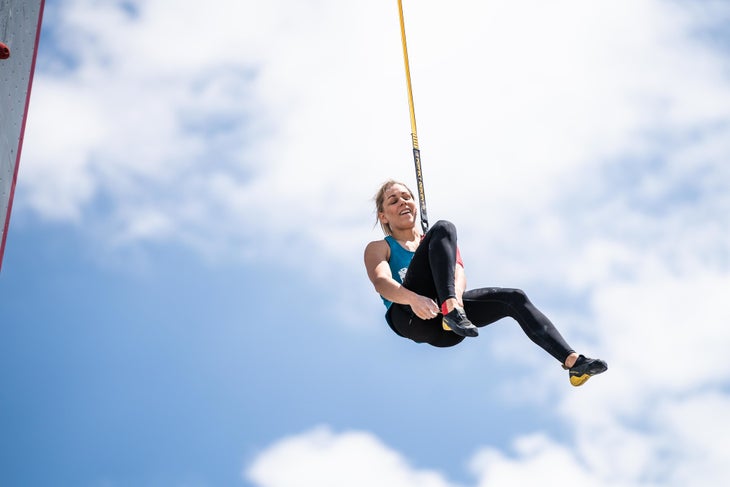
The stirring round capped off a heckuva nine-day span for the IFSC and USA Climbing, which also included a Paraclimbing World Cup in the middle of the week and the veritable transformation of downtown Salt Lake City into an international village of climbers from around the world. And the weekend, more specifically, set in motion an exciting future for Team USA, with Fulkerson entering a new echelon as a World Cup finalist, and Grossman, Raboutou, and Hunt continuing to stack up medals: Grossman’s count for 2022 currently stands at four (3 gold, 1 silver), Raboutou’s stands at three (1 silver, 2 bronze), and Hunt’s stands at two (both silver).
The next Boulder World Cup will take place in Brixen, Italy, on June 10-12.
Men’s Boulder Results
- Yoshiyuki Ogata (JPN)
- Anze Peharc (SLO)
- Kokoro Fujii (JPN)
- Jongwon Chon (KOR)
- Rei Kawamata (JPN)
- Ross Fulkerson (USA)
Women’s Boulder Results
- Natalia Grossman (USA)
- Miho Nonaka (JPN)
- Brooke Raboutou (USA)
- Futaba Ito (JPN)
- Chaehyun Seo (KOR)
- Ayala Kerem (ISR)
Men’s Speed Results
- Veddriq Leonardo (INA)
- Tobias Plangger (AUT)
- Ludovico Fossali (ITA)
- Marcin Dzienski (POL)
Women’s Speed Results
- Aleksandra Miroslaw (POL)
- Emma Hunt (USA)
- Aleksandra Kalucka (POL)
- Natalia Kalucka (POL)
